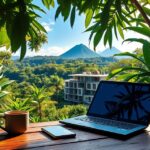How to Retire in Costa Rica Legally: Requirements and Process
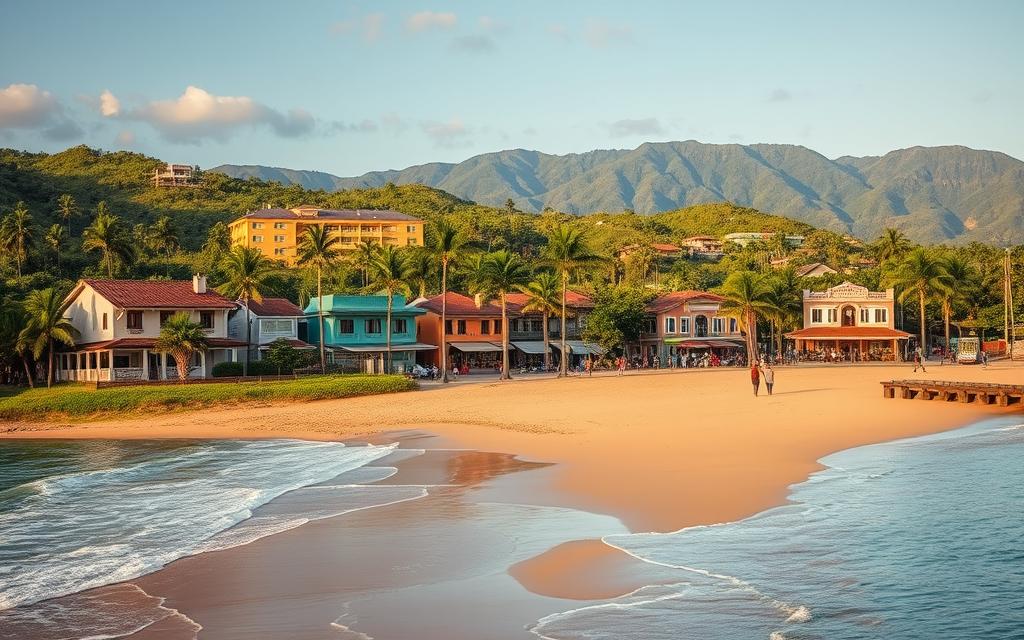
Costa Rica has become a haven for retirees seeking a better quality of life, rich culture, and breathtaking natural beauty. This Central American country offers a unique blend of modern amenities and a relaxed lifestyle, making it an attractive destination for individuals and families.
With its lush volcanic mountains, pristine beaches, and tropical climate, Costa Rica is a premier choice for retirees. The country's welcoming community and abundant biodiversity make it an ideal location for those seeking a new lifestyle.
We'll guide you through the process of retiring in Costa Rica, covering the necessary requirements, documentation, and application process. Understanding the healthcare benefits, cost of living, and ideal locations will help you make an informed decision about your retirement plans.
The Appeal of Costa Rica for Retirees
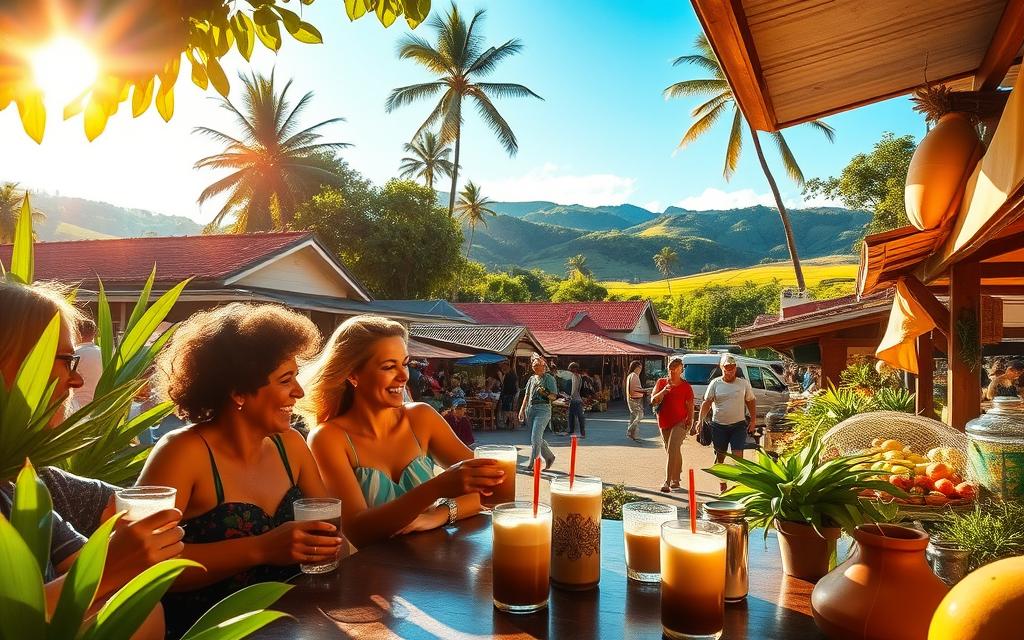
Retirees are drawn to Costa Rica because of its distinct culture and welcoming environment. We find that the country's unique appeal lies in its blend of natural beauty, cultural richness, and political stability.
The Pura Vida Lifestyle
Costa Rica offers retirees a unique "Pura Vida" lifestyle that emphasizes enjoying life, reducing stress, and focusing on what truly matters. The Tico way of life is characterized by a laid-back attitude, with family and quality of life being central priorities. This lifestyle is not just a way of living; it's a profound belief that life is what you make of it, contributing to a higher quality of life.
Political Stability and Safety
Costa Rica's political stability and safety are significant factors that contribute to its appeal as a retirement destination. The country's decision to abolish its military in 1948 has fostered a long-standing tradition of peace and democracy. As a Central American nation, Costa Rica stands out for its safety compared to neighboring countries, with lower violent crime rates and a welcoming attitude toward foreign retirees.
These factors combined make Costa Rica an attractive destination for retirees from the United States and other countries, offering a more balanced and fulfilling retirement.
Climate and Natural Beauty of Costa Rica
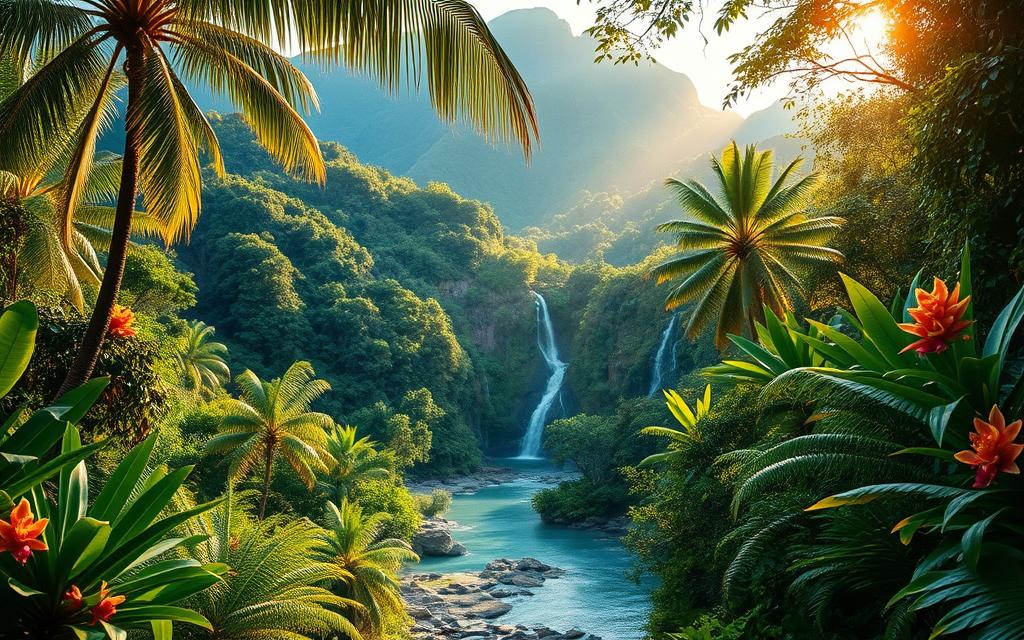
With its year-round tropical climate and stunning natural beauty, Costa Rica offers an ideal environment for retirees. The country's climate is one of the main attractions for those seeking to escape harsh winters or sweltering summers.
Year-Round Tropical Climate
Costa Rica boasts a tropical climate that remains pleasant throughout the year. Beach areas rarely experience temperatures above 32°C (90°F), while evenings in the Central Valley are typically around 18.5°C (65°F). This consistent weather allows retirees to enjoy an outdoor lifestyle every month of the year.
Biodiversity and Natural Attractions
The natural beauty of Costa Rica is characterized by its incredible biodiversity. The country is home to rainforests, cloud forests, beaches, mountains, and volcanoes within a relatively small geographic area. Costa Rica protects approximately 25% of its land in national parks and reserves, offering numerous opportunities for exploration and engagement with nature.
Costa Rica's diverse landscapes, from pristine beaches on both coasts to lush rainforests and majestic volcanoes, provide an engaging lifestyle for active retirees. The country's commitment to conservation ensures that its natural beauty remains preserved for future generations.
How to Retire in Costa Rica Legally: Residency Options
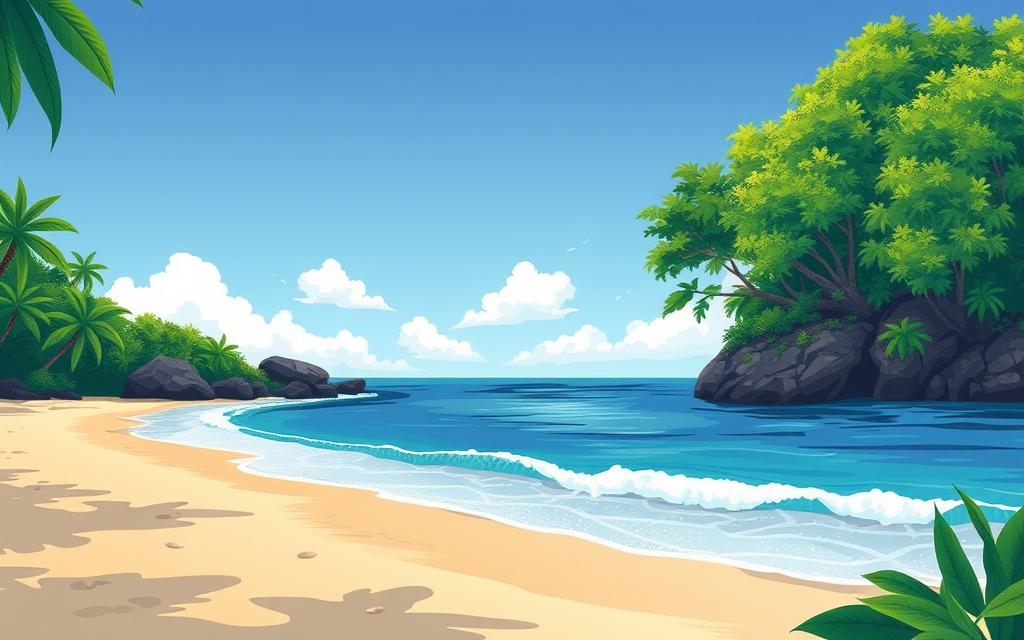
With its "Pura Vida" lifestyle, Costa Rica has become a haven for retirees, who can choose from several residency programs that suit their lifestyle and financial situation.
Pensionado Program
The Pensionado Program is designed for retirees with a guaranteed pension income of at least $1,000 per month from sources like Social Security or a retirement plan. This program is ideal for those who have a steady income and are looking to enjoy their retirement in Costa Rica. The Pensionado visa covers the applicant and their spouse, and initially grants temporary status for three years, after which permanent residency can be requested.
Rentista Program
For those without a traditional pension, the Rentista Program is an alternative. It requires proof of a stable monthly income of $2,500 or a lump sum deposit of $60,000 that will provide $2,500 monthly for two years. This program is suited for expats and retirees without a fixed pension income, offering a pathway to temporary residency that can later become permanent.
Inversionista Program
Investors can opt for the Inversionista Program, which requires a minimum investment of $150,000 in Costa Rican real estate, business, or other approved investments. This visa extends to the applicant, their spouse, and any children under the age of 25, and initially grants temporary status for three years. It's an attractive option for those looking to invest in Costa Rica while enjoying their retirement.
Understanding these residency options is key to retiring in Costa Rica legally and enjoying all that this beautiful country has to offer.
Financial Requirements for Costa Rica Retirement

Understanding the financial requirements is essential for a successful retirement in Costa Rica. To retire in Costa Rica, you'll need to meet specific financial criteria, which vary depending on the residency program you choose.
Income Thresholds for Different Programs
The Pensionado Program requires a minimum monthly income of $1,000 USD, which can be sourced from Social Security or private pension funds. In contrast, the Rentista Program demands a stable income of $2,500 per month for at least two years or a deposit of $60,000 in a Costa Rican bank. The Inversionista Program focuses on investment, requiring a minimum of $150,000 in approved Costa Rican ventures.
Proving Financial Stability
To prove financial stability, applicants must provide official documentation, such as pension letters and bank statements, that verify their income sources. This documentation is crucial in demonstrating that your income is stable and sufficient to support your retirement in Costa Rica.
By meeting these financial requirements, retirees can enjoy a comfortable lifestyle in Costa Rica, taking advantage of the country's low cost of living and rich cultural heritage.
Documentation and Application Process

Retiring in Costa Rica requires a thorough understanding of the documentation and application process. To successfully navigate this process, it's essential to be aware of the required documents and the steps involved in applying for residency.
Required Documents
To apply for residency in Costa Rica, retirees must provide a comprehensive set of documents. These include a pension letter confirming a minimum income of $1,000 per month, a birth certificate, a criminal record check, a marriage certificate (if applicable), and consular registration. All these documents must be properly authenticated (apostilled or legalized) and translated into Spanish by an official translator.
Step-by-Step Application Guide
The application process involves several steps, starting with gathering and preparing the required documents. We guide our clients through submitting their application, attending any required interviews, and understanding the typical processing times, which currently range from 18 to 24 months. Working with experienced immigration services can significantly streamline the process and help avoid common pitfalls.
After submitting your application, you'll receive temporary residency for three years before becoming eligible to apply for permanent residency, with the system requiring annual renewals during this period.
Healthcare Benefits for Retirees in Costa Rica
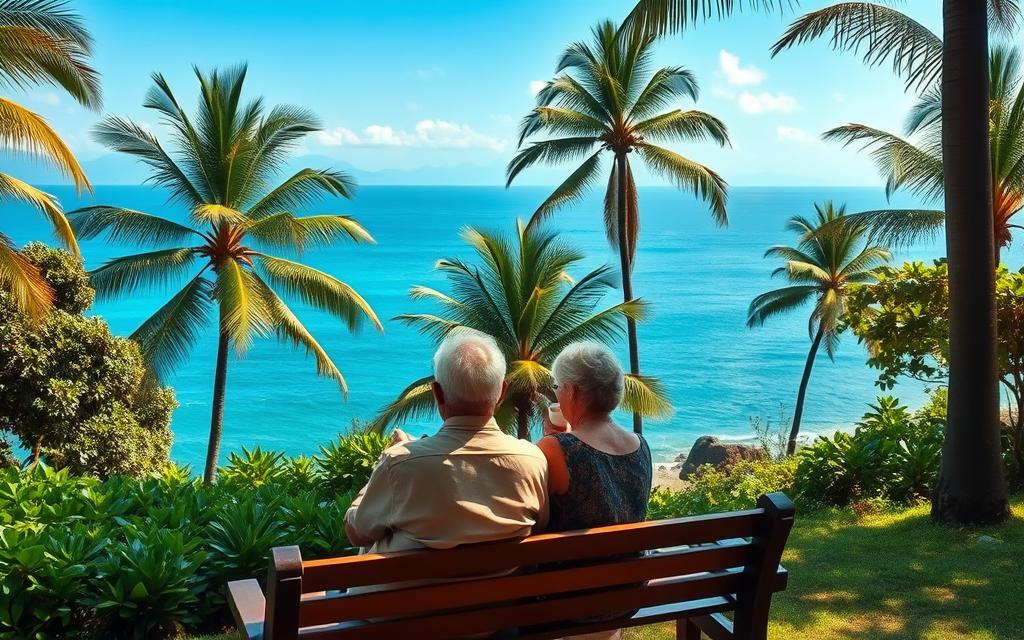
One of the top benefits for retirees in Costa Rica is access to an exceptional healthcare system. As a permanent resident, you'll have access to the country's universal healthcare system, known as Caja Costarricense de Seguro Social or "Caja."
Public Healthcare System
The public healthcare system in Costa Rica is both affordable and comprehensive. The monthly rate is based on income, typically ranging from 7 to 11 percent. The system includes a clinic in every small town and regional hospitals in larger cities, ensuring that medical care is accessible.
Private Healthcare Options
For those seeking additional or specialized care, Costa Rica offers world-class private hospitals and clinics catering to expatriates. These facilities provide modern amenities and shorter wait times, often with English-speaking staff. While private healthcare can be more expensive than the public system, it is still generally more affordable than in many other countries, including the United States.
Many retirees choose a hybrid approach, maintaining their Caja coverage while using private healthcare services for specialized treatments or to avoid wait times for non-emergency procedures. The healthcare system is considered one of Costa Rica's strongest selling points for retirees, with the United Nations recognizing it as one of the top 20 nations globally for healthcare quality.
Cost of Living for Retirees
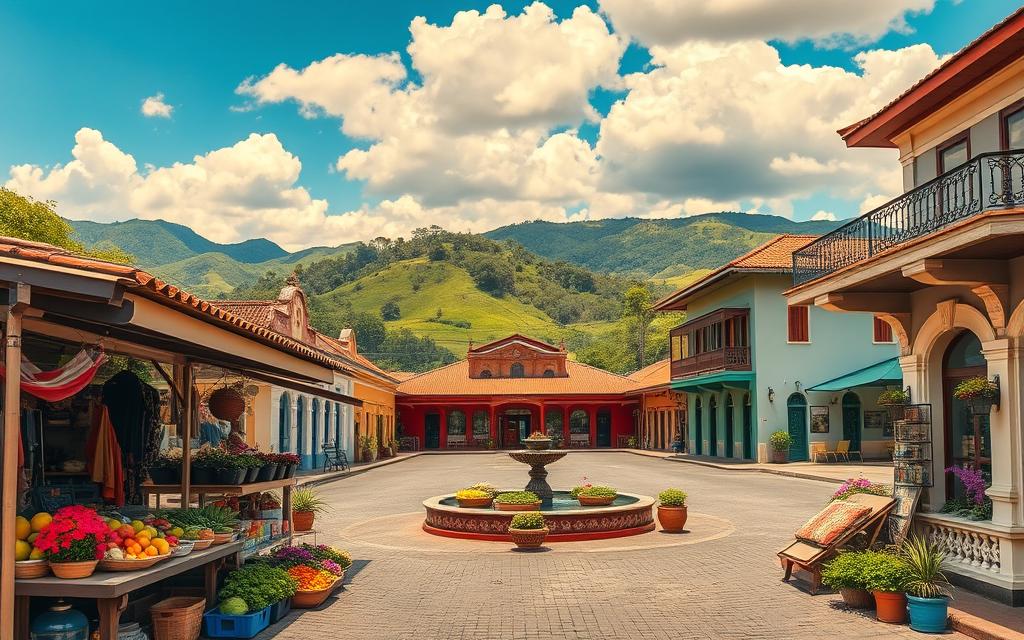
For many retirees, Costa Rica's cost of living is a major draw. The country offers a unique blend of affordability and quality of life, making it an attractive destination for expats. When considering retirement in Costa Rica, understanding the costs involved is crucial for planning.
Housing and Utilities
The cost of housing in Costa Rica varies significantly depending on the region. The Central Valley and coastal areas tend to be more expensive, while inland locations offer more affordable options. For instance, renting a one-bedroom apartment in the Central Valley can cost between $600 to $1,200 per month. Utility costs, including electricity, water, internet, and phone service, generally range from $100 to $200 per month, depending on usage. As noted on Jaros CR, understanding these costs is essential for budgeting.
Daily Expenses and Lifestyle Costs
Daily expenses for retirees in Costa Rica can be relatively low, especially for those who adopt local eating habits. Groceries for basic items can cost around $50 to $75 per week for one person. Dining out is also affordable, with meals starting from $3 to $5. Transportation costs are minimal, with public transport being very affordable. Overall, most expats can live comfortably with budgets ranging from $2,000 to $3,500 per month, encompassing food, rent, utilities, and other essentials.
Top Locations for Expat Retirees in Costa Rica
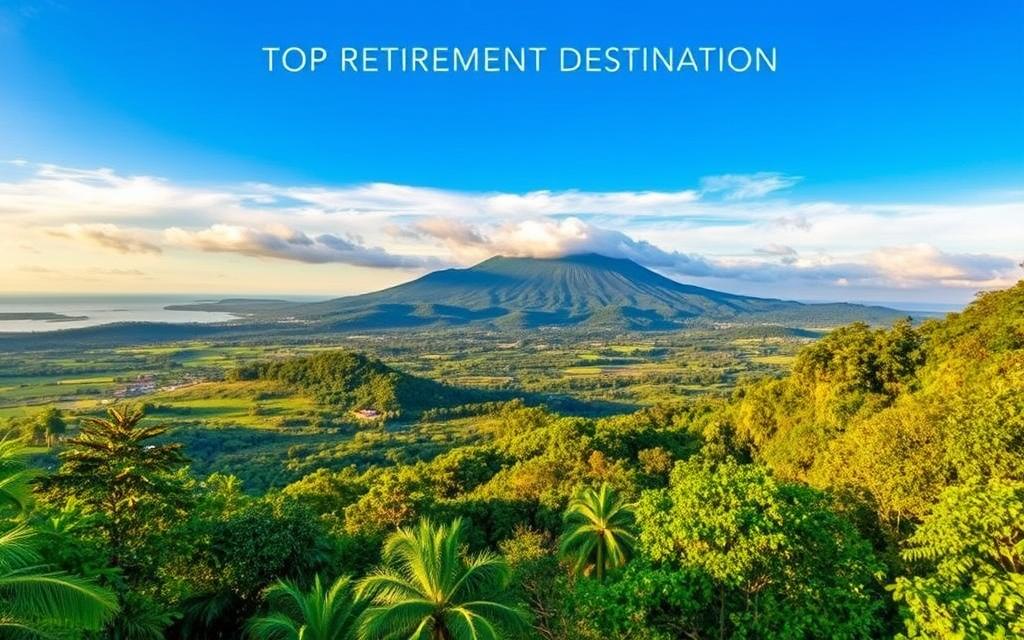
For expatriates looking to retire, Costa Rica stands out as an ideal destination, boasting diverse landscapes and a welcoming culture. The country offers various regions that cater to different preferences, from the cooler climates of the mountains to the tropical warmth of the coast.
Central Valley Communities
The Central Valley is a popular region for retirees, offering a cooler climate and proximity to San José. Communities like Escazú, Santa Ana, and Grecia are favored for their established expatriate communities and modern amenities. These areas provide a range of housing options and social activities, making them ideal for retirees seeking comfort and community.
Coastal Retirement Options
For those drawn to the ocean, Costa Rica's Pacific and Caribbean coasts offer numerous retirement options. Popular areas include Tamarindo, Nosara, Jaco, and Puerto Viejo, each with its unique charm and lifestyle. Coastal towns offer a relaxed atmosphere and opportunities for outdoor activities, making them perfect for retirees who love the beach. When choosing a location, retirees should consider factors such as climate preferences, access to healthcare, and proximity to amenities. Many retirees choose to split their time between different regions to enjoy the best of both mountain and beach living. For more information on the next steps after obtaining residency, visit our guide on post-residency steps.
Legal Considerations and Tips
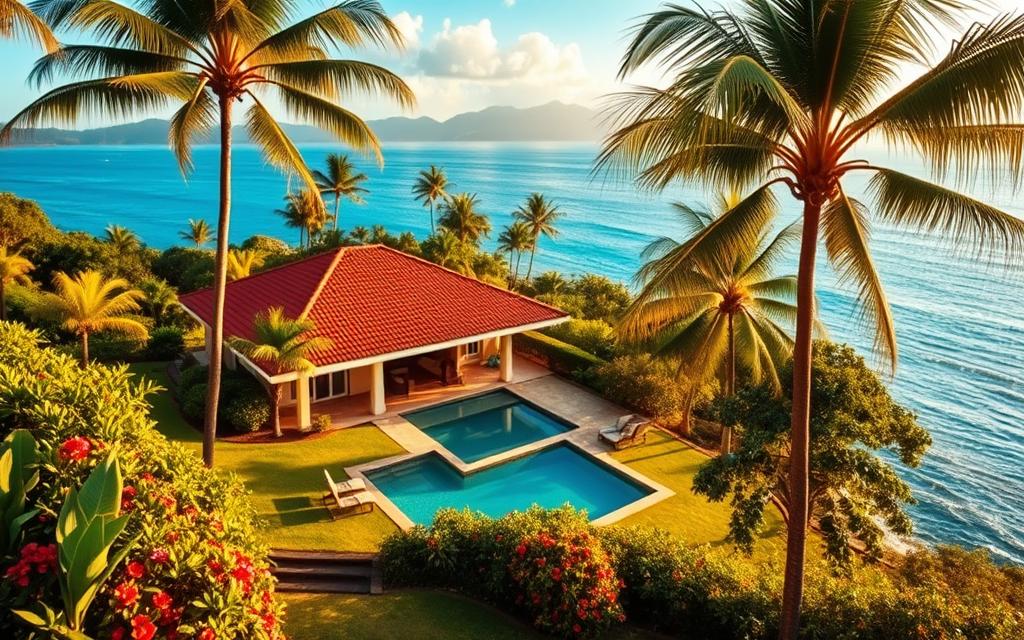
Understanding the legal landscape is crucial for a smooth transition to retirement in Costa Rica. As you plan your move, several key factors come into play.
Property Ownership for Foreigners
Foreigners can easily purchase property in Costa Rica, even on a tourist visa, without needing citizenship. However, it's crucial to work with a reputable real estate agent, as there is no centralized database to search properties. Additionally, be aware that land within 50 meters of high tide is public property, so while you can enjoy beachfront views, you won't own the beach itself. A 10% down payment is typically required when purchasing a property. For more information on residency requirements, you can visit this resource.
Banking and Taxes
The Costa Rican banking system is modern and stable, offering both dollar and colón accounts. However, you'll need your residency documentation to open local accounts. Tax considerations are also important, as you may still have obligations in your home country, such as U.S. Social Security taxes, while navigating Costa Rican tax requirements.
Common Challenges and How to Overcome Them
Costa Rica's 'Pura Vida' lifestyle is appealing, but it comes with its own set of challenges for retirees to overcome. While the country offers a relaxed and welcoming environment, there are several common issues that retirees face when living in Costa Rica.
Language Barrier
One of the most significant challenges for many newcomers is the language barrier. Although many Costa Ricans in tourist areas and the Central Valley speak English, learning Spanish is essential for deeper integration with locals and handling day-to-day tasks outside expatriate communities. We recognize that making an effort to learn the local language can greatly enhance the retirement experience in Costa Rica.
Cultural Adjustment
Cultural adjustment is another challenge retirees face as they adapt to the "Pura Vida" lifestyle, which embraces a more relaxed pace of life. This can be frustrating for retirees accustomed to efficiency and punctuality. However, most retirees report that after 1-2 years of adjustment, these challenges become minor inconveniences outweighed by the benefits of their new lifestyle and the warmth of Costa Rican culture.
By understanding these challenges and being prepared, retirees can make a smoother transition to life in Costa Rica, enjoying all that the country has to offer.
Conclusion: Making Your Costa Rican Retirement Dream a Reality
With its stable governance and excellent healthcare, Costa Rica is an ideal retirement destination. Retirees can choose from various residency options, including the Pensionado, Inversionista, and Rentista programs, to suit their financial situation. By working with experienced professionals, you can navigate the application process and enjoy a peaceful retirement. For more information on the Pensionado program, visit Jaros CR. Embracing the 'Pura Vida' lifestyle, retirees can look forward to a fulfilling life in this tropical paradise.


